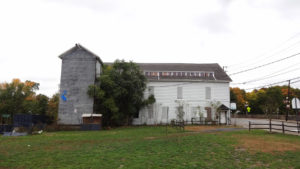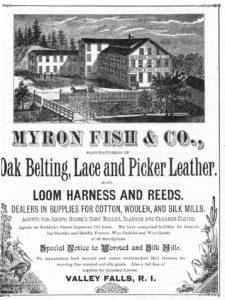MAKING INDUSTRIAL HISTORY IN CENTRAL FALLS:AMERICAN SUPPLY COMPANY LISTED ON THE NATIONAL REGISTER

Press Release from the RIHPHC: A factory in Central Falls has received federal recognition for its contributions to the history of industry. Jeffrey Emidy, Acting Executive Director of the Rhode Island Historical Preservation & Heritage Commission, announced that the National Park Service has added the American Supply Company plant to the National Register of Historic Places. The National Register is the Federal Government’s official list of properties throughout the United States whose historical and architectural significance makes them worthy of preservation. Built in 1875, American Supply Company is a significant example of a factory and supply house that supported the expanding textile industry in the late 19th century.
The American Supply Company is a vernacular, industrial building sited on a roughly one-acre lot on the south bank of the Blackstone River in Central Falls. This wood-frame building stands two-and-one-half stories tall on a fieldstone foundation. The gable roof features continuous shed dormers on its north and south slopes, and there is a square three-story stair-and- elevator tower on the south elevation. The interior retains its original materials and plan, with exposed timber framing, wood floors, and (sided-over) original sash.
In early cotton mills, loom harness—wire structures mounted on wood frames for use in power looms—were manufactured in-house. By the 1830s, loom harness fabrication emerged as a subsidiary industry to textile manufacturing. Myron Fish (1849-1929), a loom harness maker in Worcester, Massachusetts, was invited by the Valley Falls Company, a major Rhode Island textile manufacturer, to relocate his business to leased space in their Cumberland plant around 1870. Having an in-house maker of loom harness and other loom components gave the Valley Falls Company a competitive edge.

In 1875, Myron Fish and Company erected its own two-and-one-half-story, steam-powered, 40’ x 80’ factory building on land owned by the Valley Falls Company across the river in Lincoln (now part of Central Falls). The firm expanded its services to include leather belting (for driving machinery) and a wide range of supplies for cotton, woolen, and silk mills. By 1880 there were three divisions of a thriving operation. The belting works, capitalized at $7,000, employed four male operatives and produced $26,350 in finished goods. The reed works, capitalized at $2,500, employed four male operatives and produced $6,925 in finished goods. The harness works, capitalized at $27,400, employed 11 male and 7 female operatives and produced $20,330 in finished goods.
In 1883, Myron Fish & Company merged with another loom harness company (established by John Kendrick in 1846), to form the American Supply Company. In 1890, the firm purchased the land it had been leasing from the Valley Falls Company and expanded the physical plant with the construction of a perpendicular, 176’ x 40’ wing and a three-story brick power house off the rear of the original building, replacing an original, smaller ell. By 1891, American Supply Company was producing annually $400,000 worth of manufactured goods and employing 100 operatives.
Changing conditions in the New England textile economy, most notably southern competition and the devastation of the Great Depression, forced the closure of American Supply Company in 1961. The building remained vacant until Central Braid and Rug Company relocated there in 1963 and remained until 1991. By the mid-1990s, the sole tenant of the building was a street-level ice cream shop, the Scoop at the Falls.
The American Supply Company plant and its site have been targeted for riverfront redevelopment since at least the late 1990s. Toward that goal, a boat launch and a large dock adjacent to the building were constructed. The Blackstone Valley Tourism Council uses the site as the home base of its Samuel Slater canal boat and Blackstone Valley Explorer tours. Now owned by the City of Central Falls, the historic mill building is vacant and under consideration for adaptive reuse.
The National Register nomination for the American Supply Company was prepared by preservation consultant Ned Connors. RIHPHC’s Acting Executive Director Jeffrey Emidy commented, “In Rhode Island, we typically associate large, brick textile factory complexes with our industrial heritage. Smaller factories like the American Supply Company building played a pivotal role in producing the machinery that was required for those textile plants to function. This modest building is a rare survivor of an industrial supply house, and it is a promising building for redevelopment.”
In addition to honoring a property for its contribution to local, state, or national history, listing on the National Register provides additional benefits. It results in special consideration during the planning of Federal or federally assisted projects and makes properties eligible for Federal and Rhode Island tax benefits for historic rehabilitation projects. Owners of private property listed on the National Register are free to maintain, manage, or dispose of their property as they choose. As the state office for historic preservation, the Historical Preservation & Heritage Commission is responsible for reviewing and submitting Rhode Island nominations to the National Register.